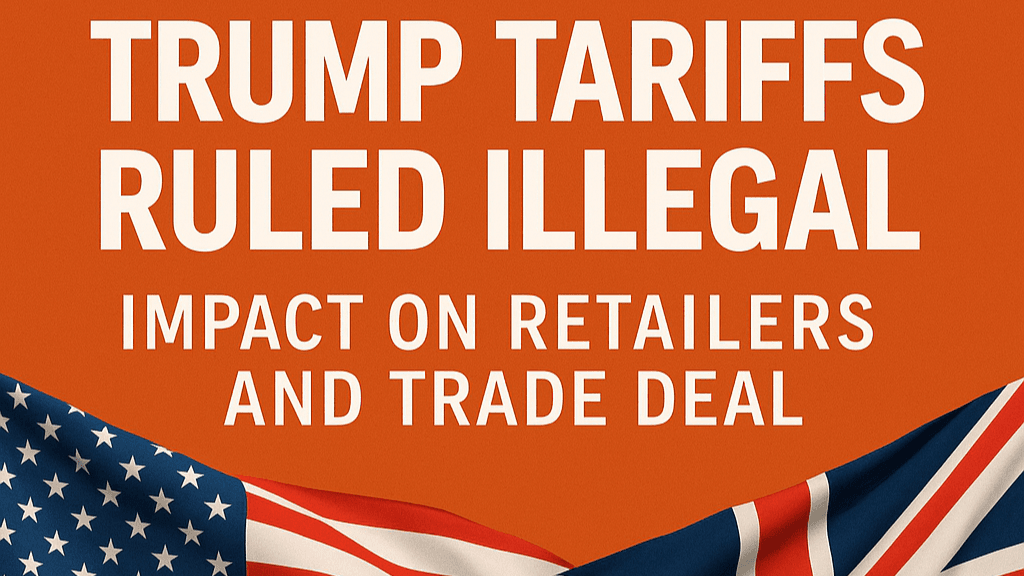News: Trump Tariffs Ruled Illegal

What It Means for U.S., U.K., and Global Retailers—and Trade Relations
In a major legal decision that could reshape international trade dynamics, a U.S. federal court has struck down the controversial “Liberation Day” tariffs introduced by former President Donald Trump. The court ruled that the administration overstepped its legal authority by imposing broad import tariffs without sufficient justification under existing trade legislation.
Background: The “Liberation Day” Tariffs
Introduced in April 2025, the tariffs applied a blanket 10% duty on a wide range of imported consumer and industrial goods. They were positioned as a measure to protect American industry and address perceived trade imbalances. However, legal challenges questioned whether the administration had the statutory authority to enact such sweeping economic measures unilaterally.
The recent ruling confirms those doubts, declaring the tariffs unlawful and effectively halting their enforcement.
Market and Economic Reaction
The announcement of the court’s decision prompted an immediate reaction in financial markets. Investor sentiment improved amid hopes that the removal of these tariffs might reduce costs for importers, ease inflationary pressures, and stabilize global trade flows.
Despite these gains, uncertainty lingers as the Trump team has indicated plans to appeal the ruling. Until a final resolution is reached, both businesses and policymakers will remain cautious.
Impacts on Retailers
U.S. Retailers
American retailers, especially large import-dependent firms, are expected to benefit significantly. With the tariffs off the table, many businesses could see reductions in input costs for goods sourced overseas. This may lead to lower prices for consumers, increased competitiveness for retailers, and improved profit margins across the sector.
U.K. Retailers
British retailers and exporters will also feel the effects. Those exporting goods to the U.S. that were previously subject to the tariffs will now have a clearer and more favorable trading environment. Additionally, U.K. companies that rely on U.S. imports may see costs drop and supply chains normalize after months of uncertainty.
Global Retailers
Retailers in other major economies—such as the EU, Japan, South Korea, and Canada—are also expected to benefit. Many of these countries were significantly impacted by the 10% tariffs, which increased the cost of doing business in or with the U.S.
With the tariffs removed:
- Exporters in these countries may regain price competitiveness in the U.S. market.
- Multinational retailers operating across borders can expect lower logistical and compliance costs.
- Supply chains may become more predictable and less politically exposed, particularly in the electronics, automotive, apparel, and consumer goods sectors.
For countries heavily reliant on trade with the U.S., this decision could ease diplomatic tensions and encourage more collaborative economic engagement.
Implications for the U.S.-U.K. Trade Deal
The timing of this ruling could have important consequences for the U.S.-U.K. trade negotiations. British officials have long expressed concerns over American tariff practices and have been pushing for a fairer, rules-based trade framework.
With this legal obstacle now removed, both sides may find it easier to reach common ground. The elimination of arbitrary tariffs could pave the way for stronger economic ties and a more balanced agreement that benefits exporters and consumers alike.
Looking Ahead
While the court’s decision is a clear rebuke of overreach in trade policy, the road ahead remains unpredictable. An appeal process may yet delay the full impact of the ruling. However, for now, the decision signals a shift toward a more transparent and law-bound trade regime.
Retailers, manufacturers, and trade negotiators across the globe will be watching closely—hoping this marks a turning point toward greater economic stability, predictability, and cooperation.


